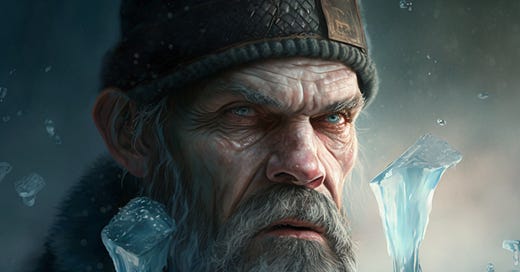They called him Iceman, having no other name for him. He had emerged one winter, breaking through the iced over surface of the river and started walking.
The villagers had rushed from their homes with blankets and hot drinks, offering comfort and somewhere to stay. But Iceman hadn’t so much as acknowledged them, trudging determinedly through the snow as the water dripping from his clothing froze both to the ground and to him.
He had trudged all the way through town and straight to the abandoned cabin at the top of the hill, as though he had known it was there all along. Maybe he had. No one had lived there for fifty years or more.
On arrival, Iceman had entered the cabin, shutting the door behind him. Within minutes, smoke rose from the chimney stack, the only sign, other than the ice left behind by his trek to the cabin, that he had truly passed through the village.
One by one, the villagers attempted to engage Iceman, bringing him food and drink, for surely he would need both to survive the winter. Never speaking, he simply nodded thanks, accepting the offerings before shutting his door once more to the world outside.
In the end, the villagers decided he was incapable of speaking, accepting this along with his other oddities without question. Though he didn’t engage in social activities, he always showed up when there was a barn to be raised or, oddly, an animal in need of birthing assistance. How he knew when to come remained a mystery.
And so it went on for the next decade until one day he didn’t show up when Ted Mercy’s cow had a breach birth. Ted shrugged it off, never having understood the man’s prescience for when he was needed.
But the next day, Iceman failed to arrive to help with the planned barn raising. Ted and a few of the other villagers made their way to his cabin. They found him lying in bed, a faded, water-stained picture of a woman none of them had ever seen before held between unmoving fingers.
As the villagers stood over his grave, they wondered at this newest mystery Iceman had left them to ponder. A man who had come from nowhere and brought questions but no answers, Iceman became a legend that only those who had known him believed in.
Whenever I enter text into a Midjourney prompt, I’m throwing dice. Sometimes I manage to get an image I have in my mind, sometimes I get something completely different.
For the creation of this image, I used a prompt with no expectation of what might emerge. I used the title from Eugene O’Neill’s play, The Iceman Cometh. No modifiers, no other instructions—just the title. I really liked this image and the story grew from it.
I also really like that Iceman remains a mystery. Why was he beneath the ice in the river? Did he know the cabin was there or was he just walking and happened upon it? Was he coming home? Where had he been? Why didn’t (or couldn’t) he speak? Who was the woman in the photograph?
This story breaks the contract in which a writer ties up loose ends for the reader of the story. But I think it establishes a new contract, one in which the writer lays out a mystery for readers to ponder. Any thoughts?






I loved the story, Dascha! What a neat image to work with, too. My imagination is telling me that he has come home (born again, maybe - reincarnated?) to search for his lost lover. But he can only find the painting, which is the only lasting remnant of her. She, like him, was swallowed up by the river.
These types of stories are so much fun. I enjoy filling in the gaps/questions!
In my writing community, I’ve been “dinged” for not tying up loose ends. You did well, and it’s okay to encourage your readers to feel a bit uncomfortable...encourage them to engage their imagination in a world that’s almost always telling us what to think and how to feel.